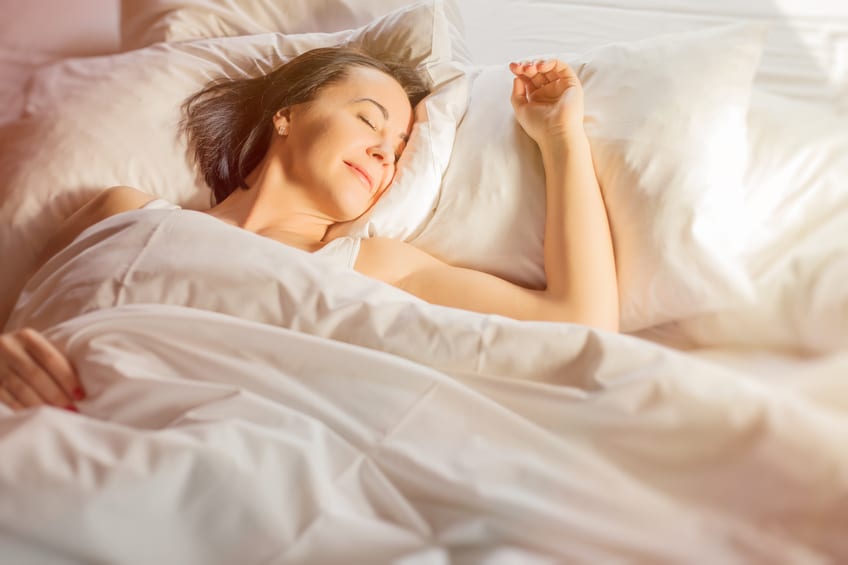Scientists have discovered an easy trick that can help you get a good night’s sleep—without drugs or the troubling side effects they cause.
Up to half of Americans suffer from some form of insomnia. And millions of them turn to sleeping pills. But studies have shown these medications can cause dangerous sleepwalking, morning-after confusion, daytime drowsiness, and even suicide.[1]
Researchers at Eindhoven University of Technology in Holland wanted to test their theory that a natural solution—breathing more oxygen and less carbon dioxide (CO2)—would lead to better sleep.[2]
Previous research has shown that high CO2 levels disrupt sleep and trigger sleep apnea. We breathe out CO2 naturally. So a tightly sealed bedroom can reduce oxygen and raise CO2 levels.
Scientists tracked the sleeping patterns of 17 healthy volunteers over five nights. On some nights, they opened a window or a door to allow air flow. On other nights, they kept the rooms closed up.[3]
They used sleep monitoring devices and next-day questionnaires to determine subjects’ sleep quality. They also monitored CO2 levels in the bedrooms.
Fresh Air = Better Sleep
They found that with either a door or window open, CO2 levels fell on average from 1,150 particles per million (ppm) to 717 ppm, or about 30%.[4]
During the nights with lower levels of CO2, subjects enjoyed “better sleep depth, sleep efficiency, and lesser number of awakenings,” the researchers reported.
They found that opening a window is slightly more beneficial than keeping the door open. It lowered CO2 by an extra 30 ppm.
The researchers say running an air conditioner also lowers CO2. But air conditioning was not tested in the study, which was published in the journal Indoor Air.
5 More Ways to Improve Your Sleep
There are other effective non-drug solutions that can help give you a good night’s sleep:[5]
1.) Melatonin. This hormone is produced by your pineal gland. It regulates and encourages your natural sleep cycle. A great natural source of melatonin is tart cherries.
If you take a melatonin supplement, be careful not to take too much, which can actually harm sleep. Start with half the dosage recommended on the label. Melatonin works best for insomnia caused by jet lag or time change.
2.) L-tryptophan. This amino acid helps your body produce serotonin, which increases relaxation. Great sources of L-tryptophan include organic poultry, fish, eggs, and beef.
3.) A cold room. Research has found that the best temperature for sound sleeping is between 60 and 67 degrees.[6]
4.) Daily exercise. There’s a reason exercise is one of the most recommended remedies for insomnia: It works. Even light exercise during the day helps you sleep at night. But don’t exercise within three hours of bedtime.
5.) Avoid blue light after dark. A Harvard Medical School study found that using blue light-emitting devices like computers, tablets, and smartphones just before bedtime can wreck your sleep. Blue light suppresses melatonin production. If you are a bedtime reader, stick to an old-fashioned printed book instead of reading from a device.
One more thing…
How long has it been since you sprung for a new mattress? Sleep researchers have found that mattresses older than 10 years can lose their comfort and hinder sound sleep.
If you’ve been sleeping on the same mattress for a decade or more, consider buying a new one.
Editor’s Note: Unlike much of the mainstream media, we don’t accept advertising from Big Pharma. That’s why you can count on us for unbiased medical information. Our only motivation is your good health.
Our monthly journal Independent Healing brings you important, science-based health news you won’t find anywhere else. To subscribe, go HERE.
Related Articles
One Fruit Juice Improves Sleep
This One Healthy Habit Can Cure Insomnia in Just a Week
5 Ways to Fall Back Asleep Fast After Waking in the Middle of the Night
[1] http://www.sleepmanagement.md/sleepdisorders/Insomnia.aspx
[2] https://consumer.healthday.com/sleep-disorder-information-33/misc-sleep-problems-news-626/seeking-better-sleep-here-s-one-simple-step-to-help-728763.html
[3] http://onlinelibrary.wiley.com/doi/10.1111/ina.12435/full
[4] http://onlinelibrary.wiley.com/doi/10.1111/ina.12435/full
[5] https://sleepfoundation.org/sleep-tools-tips/healthy-sleep-tips
[6] https://sleepfoundation.org/sleep-tools-tips/healthy-sleep-tips

